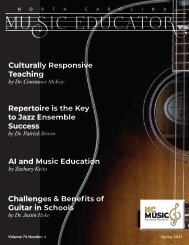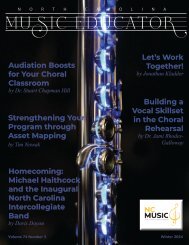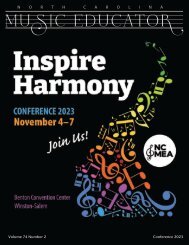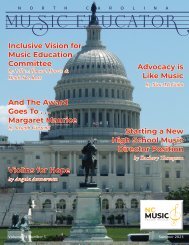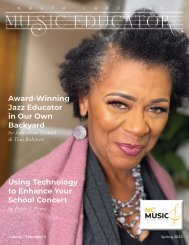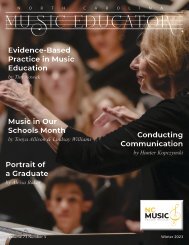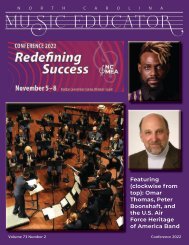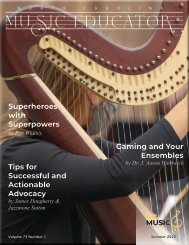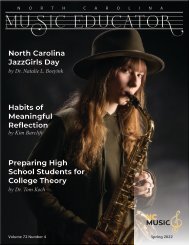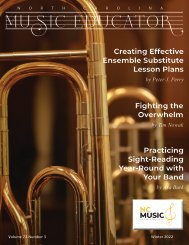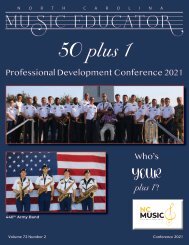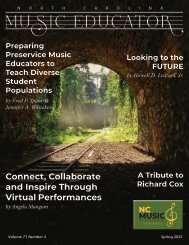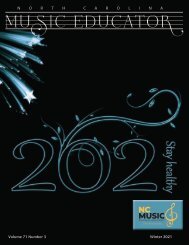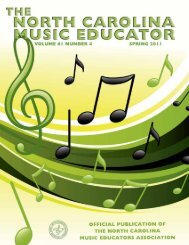North Carolina Music Educator Journal Summer 2021
Professional journal for North Carolina music educators, Summer 2021
Professional journal for North Carolina music educators, Summer 2021
Create successful ePaper yourself
Turn your PDF publications into a flip-book with our unique Google optimized e-Paper software.
eal. Individual situations greatly impact our ability to respond to<br />
these profound challenges, including resources, family support,<br />
and existing SEL competencies; however, many of these are out of<br />
students’ control. Students have been away from school and their<br />
friends for five months. Issues of reentry, trust, and mental health<br />
will be paramount (along with the obvious need for physical<br />
health precautions).<br />
Students often rely on music teachers and the music classroom<br />
for security, school connectedness, and support. They need us now<br />
more than ever. This doesn’t mean we disregard music and focus<br />
solely on social and emotional challenges. These conversations can<br />
be valuable; however, we must remember we are music teachers,<br />
not licensed counselors. Students gravitate to us because of music;<br />
we must not forget that. As the school year begins, students<br />
will need opportunities to regain trust, interacting with people<br />
and reconnecting and rebuilding relationships, and they will be<br />
starved for music. It will be our job to meet all those needs.<br />
SEL skill-building can help with these challenging tasks. Below<br />
are the three broad goals of SEL (derived from the CASEL, Illinois<br />
SEL Standards), relevant skill sets, and musical strategies.<br />
While music classrooms will look, feel, and sound different<br />
than they did pre-pandemic, with purposeful, thoughtful, and<br />
realistic instruction focused on the students and MSEL, you can<br />
facilitate an environment where students can reconnect with the<br />
space and the people who mean so much to them.<br />
Advocating Utilizing SEL<br />
SEL represents a widely accepted construct policy makers at all<br />
levels value. To effectively make an argument, all elements of SEL<br />
are needed:<br />
• Realizing the personal-collective value of music education<br />
(self-awareness);<br />
• Understanding how this value will be perceived by<br />
decision-makers (social-awareness); and,<br />
• Promoting music education through advocacy (responsible<br />
decision-making).<br />
Engaging students in this process not only lends relevance to<br />
music education’s value but also models/teaches students these<br />
important skills while forwarding the cause for music education.<br />
Compelling arguments for music education utilizing SEL are:<br />
• Purposeful integration of SEL into music education will<br />
enrich the students’ personal connection to music.<br />
• The relationship built between teacher and students over<br />
multiple years of instruction fosters the caring environment<br />
necessary to help build school connectedness and foster<br />
empathy.<br />
• The perseverance needed to dedicate oneself to musical<br />
excellence fosters resiliency in and out of the music<br />
classroom.<br />
• <strong>Music</strong>al creation fosters self-awareness and allows students<br />
to develop a greater sense of autonomy and emotional<br />
vocabulary.<br />
• The collaborative community developed in the music<br />
classroom around music-making welcomes discussions and<br />
an awareness of acceptance and embraces diversity.<br />
• <strong>Music</strong>ians learn the necessity of personal goal setting,<br />
self-assessment, and accountability as they develop high<br />
standards for musicianship and themselves.<br />
• <strong>Music</strong> education provides developmental experiences<br />
that actively allow students to practice and hone socialemotional<br />
competencies.<br />
SEL will be front and center for administrators, and MSEL can<br />
provide one solution to help our students cope, heal, and move<br />
forward through music.<br />
Onward<br />
We have often been told the only way out is through. This is<br />
true as we prepare for musical performances, struggle to teach<br />
a musical concept,<br />
persist through personal<br />
musical roadblocks, and<br />
navigate the profound<br />
social and emotional<br />
challenges associated<br />
with the COVID-19<br />
pandemic.<br />
11TH ANNUAL DECEMBER 2 - 4<br />
onor Band Festival<br />
UNC WILMINGTON<br />
Many of our students<br />
are mourning the loss<br />
of music education as they know it and are craving the support<br />
and security they have relied on. Rough, uncomfortable waters lie<br />
ahead; however, music is a cultural necessity and is fundamental<br />
to being human. <strong>Music</strong> education and SEL exposes and deepens<br />
this for our students. Through our intentional integration of SEL,<br />
our students will build the social emotional skills to thrive in our<br />
Dominic Talanca conductor<br />
uncw director of bands<br />
Rodney Workman guest conductor<br />
asheville high school · asheville<br />
Contact Dominic Talanca<br />
www.uncw.edu/music<br />
talancad@uncw.edu<br />
910.962.3391<br />
NOMINATIONS DUE OCT. 6, <strong>2021</strong><br />
SEL Goals Skills Strategies<br />
Self:<br />
Develop self-awareness and<br />
self-management skills to achieve<br />
school and life success.<br />
• Identify and recognize emotions<br />
• Persist<br />
• Cope<br />
• Manage stress<br />
• De-escalate emotions<br />
• Utilize emoji worksheets for reflection, listening<br />
exercises, and current mood assessment.<br />
• Give students opportunities to self-evaluate their<br />
current emotional state and the time and space to<br />
recenter (e.g., “I need a break” pass; calm corners;<br />
anxiety meters).<br />
Others:<br />
Use social awareness and<br />
interpersonal skills to establish<br />
and maintain positive<br />
relationships.<br />
• Cooperate<br />
• Be empathetic<br />
• Build relationships<br />
• Have concern and compassion for others<br />
• Seek and provide help<br />
• Collectively develop a soundtrack of meaningful music<br />
that can be played as students enter class.<br />
• Develop teams of students willing to help with<br />
reasonable tasks to keep music classrooms safe<br />
(following all school, district, and health professional<br />
guidance and only allow students to do what is<br />
possible and safe).<br />
Decisions:<br />
Demonstrate decision-making<br />
skills and responsible behaviors in<br />
personal, school, and community<br />
contexts.<br />
• Promote one’s own health<br />
• Avoid risky behaviors<br />
• Anticipate consequences<br />
• Analyze situations<br />
• Plan realistic and adaptive response strategies<br />
• Have students inventory and rank music classroom<br />
activities in terms of risk, their comfort performing<br />
them, and protocols that could make them feel safer.<br />
• Create a new mission statement accounting for<br />
musical, social, and emotional objectives accounting<br />
for a decreased emphasis on performance.<br />
www.uncw.edu<br />
UNCW is an EEO/AA Institution. Accommodations for disabilities may be requested by contacting the Disabilities Resource Center<br />
at 910.962.7555 at least seven days prior to the event.<br />
Questions regarding UNCW’s Title IX compliance should be directed to titleix@uncw.edu.<br />
26 | NORTH CAROLINA MUSIC EDUCATOR NORTH CAROLINA MUSIC EDUCATOR | 27




